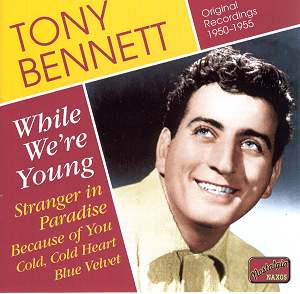Tony Bennett’s career was
made in the first five years of the 1950s,
between the time he signed his first record
contract in 1950 and the birth of Rock &
Roll. This album does a solid job of capturing
this part of his career, as it simply a collection
of all of his early hits with nothing notable
left out. Bennett first scored #1 in America
with "Because of You", followed
the same year with the Hank Williams penned
country song "Cold, Cold Heart".
"Blue Velvet", "Strangers in
Paradise" and "Rags to Riches"
were other early Bennett hits, all here. In
fact, Naxos appears to have taken a lesson
from rock and pop singers and truly made a
greatest hits album, sans the title "Greatest
Hits".
The selections are all unmitigated
pop recordings, as this is Tony Bennett before
he became a jazz icon. The majority of the
songs display exactly what it was that made
Bennett a star in the pre-Rock era. His voice
rings clear and true, and the songs are lushly
orchestrated. This is the easiest of easy-listening.
By 1957 Bennett had left this type of recording
behind, but at this point in his career he
was making recordings that highlighted his
ability to be a young heart throb.
He’s able to believably tell
the story of many a young man. Or at least
he can be in any stage of the cycle of love
and be believable. He can be an angst-ridden
young man with his heart broken in "Boulevard
of Broken Dreams" or cocky heartbreaker
in "I’m the King of Broken Hearts".
He can be happily deluded of his chances with
the woman of his dreams in "There’ll
Be No Teardrops Tonight", or begging
for a second chance in "Take Me In Your
Arms Again". He can even seem just a
bit obsessed and lovelorn, though in a charming
kind of way, while singing "Please Driver
(Once Around The Park Again)". It does
strike you how many songs are some form of
love songs when confronted with this collection.
Bennett seemed to do nothing aside from play
the part of a lover in some capacity. Regardless,
this is indicative of the era and of this
stage of his career, and in the role of lover
he displays a good deal of range and ability.
Recording wise, the sound
is clean and crisp for the most part, even
though at times it sounds as if Bennett is
singing to an empty opera hall. There is nearly
no audible noise on the album, though the
fidelity is definitely indicative of the era.
The arrangements are those full-string-section
songs with big band era horns and rhythm sections
that remind a listener of the Rat Pack.
This album is ideal for any
listeners who want the early hits of Tony
Bennett, either to experience the sounds of
the pre-rock era or to discover his work as
a young man. The recordings are lovingly restored.
While the songs do tend to be fluff, it is
the good kind of fluff. They’re timeless songs
frozen in the innocence of 1950s entertainment.
Patrick Gary
